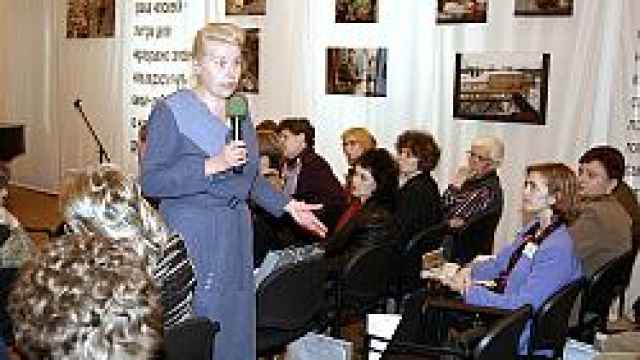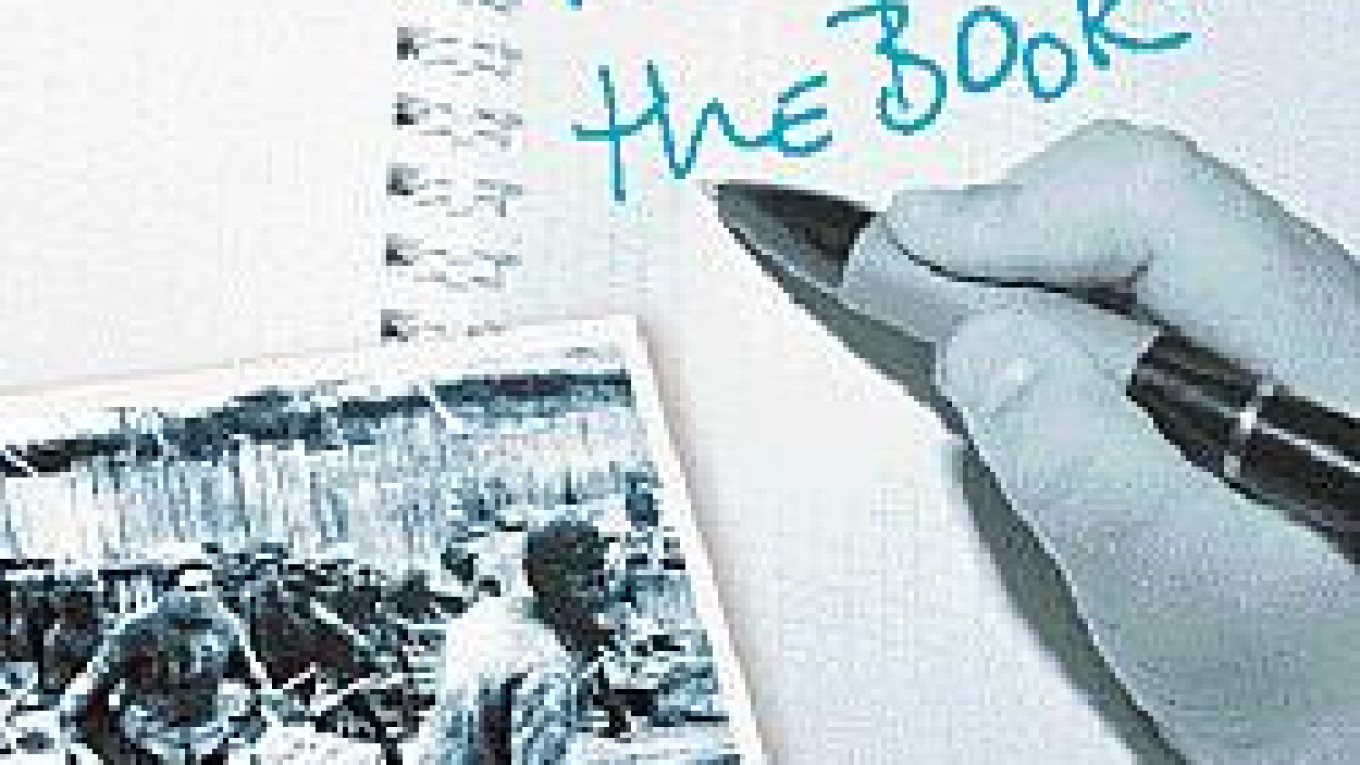This moral dilemma was posed to students by Natalya Lyapina and Oksana Fatina, history teachers from Novomoskovsk in the Tula region. Their videotaped lesson took one of the top prizes last week in a contest for the best lesson on the topic of political repression and resistance, run by the Andrei Sakharov Museum and Public Center.
"I am quite outraged by the fact that studying the history of political repression, and giving it the status of a state crime, isn't a compulsory part of the school program," Sakharov Museum director Yury Samodurov said last Friday at a conference devoted to the competition. "If the government won't do it from above, then it means we have to do it from below."
The competition, which aims to encourage school teachers to spend more time educating their students about Soviet repression, attracted almost twice the number of entries as it did in its first incarnation one year ago. "We feel that what we are doing is necessary and in demand," Samodurov commented.
Yet switching over to free discussion of the past has proved difficult in Russia. Most current school textbooks barely mention such sore points as the mass deportation of the Chechen and Ingush nations in 1944.
Textbook patriotism received an official thumbs up last November, when President Vladimir Putin commented that history books "should instill a sense of pride in one's history, and one's country."
Some interested teachers were even dissuaded by their schools from participating in the Sakharov Museum's competition, which is sponsored by the Open Russia Foundation. "There were situations when a teacher wanted to take part in the competition, but didn't receive permission from the administration," said Yelena Zakharova, a jury member and senior lecturer at the Moscow Institute of Open Education, adding, "There were times when they were simply banned from videotaping lessons."
Some of the contest's 235 entrants, most of them women, came from places notorious for their Soviet labor-camp past, such as the city of Vorkuta in the Far North, where prisoners mined coal, and the Siberian city of Krasnoyarsk. Shown in taped fragments, their lessons featured blackboards covered in dates and facts, fieldtrips to sites such as a former prison-camp mine, and pupils staging plays. One teacher read the following lines from Anna Akhamatova's poem, "Requiem": "It happened like this, when only the dead / Were smiling, glad of their release."
Prizewinners Lyapina and Fatina divided their class into two groups. The first group was assigned symbols of Soviet triumphalism: a bust of Stalin, propaganda posters, a red flag. The second was given real aluminum dishes and quilted jackets from the prison camps. Both groups were asked the same question: "Was the Soviet Union a great state?"
Then the children were given the details of the scenario described above, a true story from the 1930s in which a boy's parents were arrested and he asked his neighbors if he could take shelter at their apartment. After discussing the situation, the pupils had to give one of three answers: "I would let him in because ...," "I would not let him in because ...," and "I don't know how to answer."
"There were some who said, 'No, it was necessary to resist at whatever cost,' while others said, 'Unfortunately, you only live once,'" Fatina recalled.
"They had the chance to really understand that you can talk about human values, about human rights, but that when it affects you personally, you have conscience, honor and decency on the one hand, and the camp awaiting you on the other. Not only you, but all your family," Lyapina said.
 Ruslan Kochetkov / For MT Galina Klestova was among the 265 teachers participating in last week's conference. | |
All of the teachers present were educated at least partly in the Soviet era, and several commented that they were still at school in 1988, the year when, in an extraordinary step, the official history exam was canceled, due to a new spirit of glasnost and open discussion of prison camps and political arrests.
"It turned out that the history that we had studied was not the history that had really happened," said Svetlana Bochkina from the republic of Mordovia. "I believe that my children have outgrown me as I was in 1988, and I see that as the result of my work."
Appearing at the conference was one of last year's winners, Grigory Plotkin, with a poem of his own composition ending with the lines: "Russia can only be saved by a teacher, not by a leader." Plotkin said that he began teaching history in the Soviet era, and that it had been a "torturous" step for him to change his views. Joseph Stalin had always been a negative figure in his eyes, what with his grandfather's death in the purges and the subsequent suffering of his grandmother, a loyal communist. But he had always respected Vladimir Lenin, and it was only in the time of perestroika that he began to see the Bolshevik leader and Stalin as "links in the same chain."
Still, not all the teachers agreed as to how the Soviet period should be presented. Some were in favor of putting a more heartwarming spin on the difficult stories. "I have very big doubts about the way the information is being put across," said Lyubov Maksimova, criticizing the focus on "suffering and humiliation." Just giving chernukha (muckraking) is "not correct," she explained. "It's important to show that a person wasn't broken by this situation, and tried to survive."
Similarly, Lyapina, a younger teacher, said that her pupils used to ask her about the 1970s and 1980s, wanting to know how people could smile when life was so terrible. "If we only concentrate on political repressions, we will deepen this rift still further," she said.
If the opinions of conference participants seem mixed, society as a whole is even more divided. According to Boris Dubin, head researcher at the Yury Levada Analytical Center, Russians have become increasingly focused on the positive aspects of the Soviet era. Asked in 1989 what they considered Russia's most significant historical event, a third of respondents named the purges of the 1930s. Today, only 17 percent gave that answer, while 40 percent of Russians now name Stalin as Russia's most outstanding historical figure, as compared to 11 percent in 1989.
"There is a tendency to paint a big, official, patriotic, power-centered picture of history," Dubin said. Taken as a whole, he commented, the general line of thought goes something like this: "Whatever else Stalin did, he was the one who led us to victory [in World War II]."
Still, emphasizing Stalin's repressions to the exclusion of everything else is not the solution, said a number of historians at the conference, arguing that to do so neglects the question as to why people supported the Soviet regime in the first place. "A modern schoolchild can quite easily understand the idea of resisting bondage, but does he understand the idea of running away from freedom?" asked Vladimir Buldakov, senior researcher at the Institute of Russian History.
"If we forget, we are doomed to many unpleasant things," said Igor Yakovenko, head researcher at the Institute of Sociology. "The Soviet idea seems to be completely washed up, but totalitarianism is possible not only in communist societies.
A Message from The Moscow Times:
Dear readers,
We are facing unprecedented challenges. Russia's Prosecutor General's Office has designated The Moscow Times as an "undesirable" organization, criminalizing our work and putting our staff at risk of prosecution. This follows our earlier unjust labeling as a "foreign agent."
These actions are direct attempts to silence independent journalism in Russia. The authorities claim our work "discredits the decisions of the Russian leadership." We see things differently: we strive to provide accurate, unbiased reporting on Russia.
We, the journalists of The Moscow Times, refuse to be silenced. But to continue our work, we need your help.
Your support, no matter how small, makes a world of difference. If you can, please support us monthly starting from just $2. It's quick to set up, and every contribution makes a significant impact.
By supporting The Moscow Times, you're defending open, independent journalism in the face of repression. Thank you for standing with us.
Remind me later.


